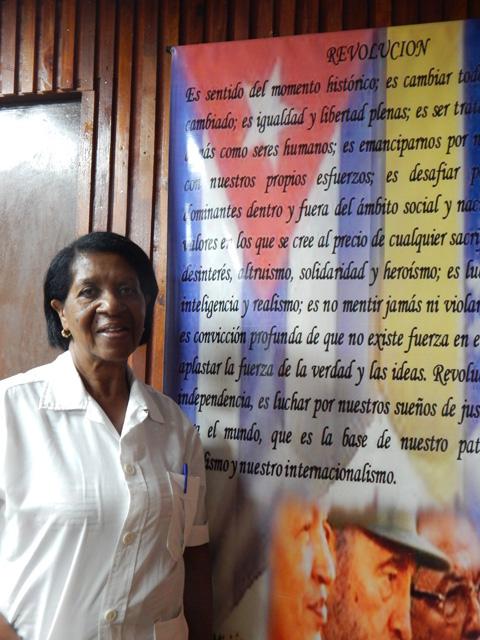
For Rita Silvina Cuevas Dorce, working as an internationalist collaborator has meant settling her debt with the Revolution. She currently works in the diagnostic laboratories of the Comandante Manuel Fajardo Clinical-Surgical Teaching Hospital in Havana.As she told Granma International: “When the earthquake struck in Pakistan, the directors of the Cuban Ministry of Public Health made a selection of the best sector workers to help that Asian country. It turned out to be my first mission with the Henry Reeve International Contingent of Doctors Specializing in Disaster Situations and Serious Epidemics, created by the Comandante en Jefe, Fidel Castro, on September 19, 2005.”“I traveled on November 4 of that year and was away until March 25, 2006. I was assigned to work in a rural area. When the medical brigade arrived, we put up tents and there we established the hospital. I remember the big snowfalls at night and the ice on the roofs. We set up the laboratory with improvised equipment in one of those tents. To process some tests we had to bring them closer to the heater, because the low temperatures prevented obtaining the real results.”
What were your main impressions of the place?
The population marketed agricultural products, there was a great lack of many material resources and an accentuated practice of the Islamic religion.
At first, women were forbidden from being examined by Cuban doctors, but little by little we were able to gain their trust until they saw us as professionals and agreed to be clinically examined.
How did you communicate with patients?
The language turned out to be an obstacle. We communicated in English with Pakistani colleagues, but with the population we needed volunteer translators. We also learned short dialogues to find out the essentials.We were struck by the prayer times. They pray at six in the morning, midday, and six in the afternoon, they abandon all activity to fulfill that mandate. When we arrived in Islamabad, the capital, we woke up scared after six o’clock, because we noticed an echo in the environment, and then they explained to us that the prayers are undertaken in unison and everything stops working.
We also felt several aftershocks of the earthquake that scared us. Once an earthquake occurred in Afghanistan and we felt the tremor as if it were happening right beside us. The tents moved for a few minutes and we ran to an open place. Luckily, before leaving Cuba they had explained to us how we should handle a natural catastrophe of such magnitude.
After your work in Pakistan, did you join any other medical brigades?
I went to Bolivia in May of 2006 until September 2008. I worked in a private clinic belonging to an Italian, located in the rural community of Matogroso, in the city of Carabuco. There, about 20 Cubans covered services in several medical specialties.
The owners opposed our work and the government had to intercede. They did not understand that medical care should be provided free of charge. We had to firmly fight not to charge for the surgeries. We achieved that because we accepted that only the entry to the institution would be paid, something they called “the threshold.”
How did the population treat you?
The population worked in agriculture and on several occasions we were visited by President Evo Morales, I met him personally and he treated us as friends.Before the Cuban medical brigade arrived, the residents healed their wounds with plants. In many cases they became infected. They died of tuberculosis and malnutrition. We managed to improve health indicators. They appreciated us, because Cuban doctors touched the patients, regardless of class or social origin.
Your work experiences in Bolivia?
In Bolivia, I came into contact with parasites that I never saw in Cuba. I also had to teach several young Bolivians how to conduct laboratory tests. I witnessed how the tuberculosis infection rate fell thanks to the intervention of Cuban doctors. I also witnessed the teaching of literacy to the population using the Cuban Yo, Sí Puedo method to learn to read and write.
Why do you say that you have paid off a debt to the Revolution?
As a child, I witnessed how my family participated in the actions to support the guerrilla in the Sierra Maestra, led by Fidel Castro until the triumph of the Revolution. I watched them make July 26 Movement flags, armbands, and olive green uniforms.In my house there were several meetings of revolutionaries to support the Rebel Army. I felt unfulfilled as I did not participate directly in those tasks and that feeling stayed with me. I only felt good when I fulfilled those internationalist missions.















